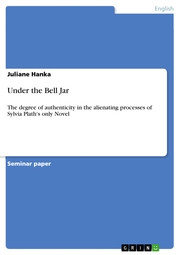Detailansicht
Under the Bell Jar
eBook - The degree of authenticity in the alienating processes of Sylvia Plath's only Novel
ISBN/EAN: 9783640110216
Umbreit-Nr.: 4608149
Sprache:
Englisch
Umfang: 27 S., 0.58 MB
Format in cm:
Einband:
Keine Angabe
Erschienen am 23.07.2008
Auflage: 1/2008
E-Book
Format: EPUB
DRM: Nicht vorhanden
- Zusatztext
- Seminar paper from the year 2008 in the subject American Studies - Literature, grade: 1,0, Dresden Technical University (Institut für Anglistik/Amerikanistik), course: The 1950s and 1960s in American Literature, language: English, abstract: 1 Introduction Sylvia Plath ended her Life by gassing herself in a stove on February 11th in 1963. This is not the most important fact about the poet and yet the best known detail of her life. Since her death, Plaths work and her life have been irrevocably interblended. Thus, she is either interpreted as a courageous but suppressed female writer or as a dark and mentally disordered summoner of death. In either case she had been mystified as a kind of tragic hero and some critics continue with this kind of blind Plathophilia (Bachner 2008) until today. Although her artistic work is mainly composed of poems, her only novel will be the object for the following interpretation of the protagonists alienation in comparison to respective events in the authors life. Being so closely connected it is impossible to reflect on the novel without factoring her life into the described events of alienation in The Bell Jar. Thus, after introducing the influencing social circumstances of her time, the paper concentrates on Sylvia Plaths degree of authenticity in her writing. On the basis of these findings, two different stages of the protagonists alienation are to be developed and afterwards her ambivalent relation towards the opposite sex is being discussed as a major consequence to her schizoid attitudes towards her desired social status. Finally, the analysis deals with Plaths strong symbolism, in which the mirror serves as frequent metaphoric means to illustrate estrangement not only from the outside world, but also from her inner self. Another one, the fig-tree, stands for the inability to decide for a certain way of life. Both are crucial problems of the protagonist Esther Greenwood and it is to examine, in how far they reflect on Sylvia Plaths personal experience. This paper discusses Plaths alienating processes from a rather feminine perspective as the 1950s common American values exerted huge pressure on every member of society, but mostly on women.
- Kurztext
- Seminar paper from the year 2008 in the subject American Studies - Literature, grade: 1,0, Dresden Technical University (Institut für Anglistik/Amerikanistik), course: The 1950s and 1960s in American Literature, 18 entries in the bibliography, language: English, abstract: 1 IntroductionSylvia Plath ended her Life by gassing herself in a ...
